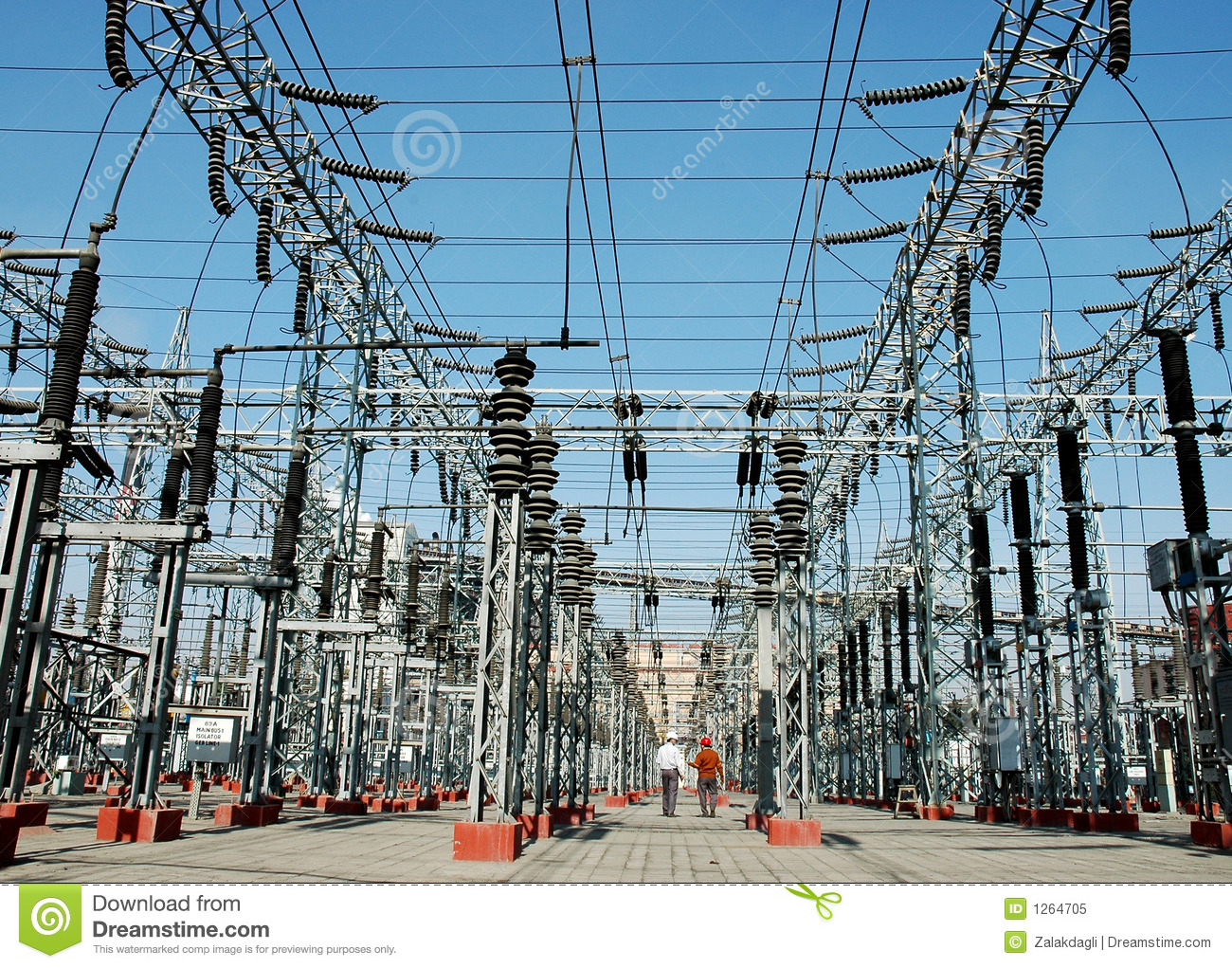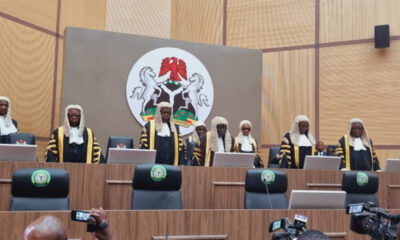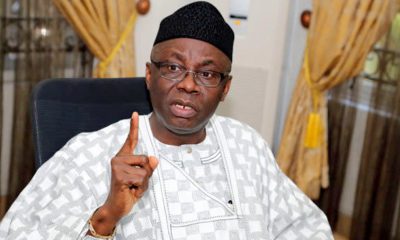metro
Saboteurs Hold Nigeria Hostage As Power Grid Collapsed 115 Times In 9 Years

With the recent three power grid collapses in less than 30 days, there are worries that acts of power infrastructure vandalism is on the rise.
The latest system collapse occurred on April 8, 2022 around 6.30pm as the national power grid plunged from 2,400 megawatts (MW) some 30 minutes earlier to a zero level, causing widespread outage.
According to insider reports, attempts to restore the power grid suffered a setback around 8:50pm on the same night as the system tripped off again, with an outage lasting through to the next day in many parts of the country.
The latest grid disruption came just about 24 days after similar incidents on March 14 and 15, 2022. An industry official said the system collapse was multiple, especially from the gas-fired power plants.
The Minister of Power, Abubakar D. Aliyu, an engineer, had conveyed an emergency meeting that lasted through Monday night, where he tasked the operators on working together to make electricity more stable.
While power generation companies (GenCos) had a day before the previous collapse complained of poor revenue to procure gas, as well as technical issues with mostly the units of gas-fired plants, the vice chairman of the Nigerian Electricity Regulatory Commission (NERC), Musiliu Oseni, at a briefing in March, blamed one of the collapses on the tripping of a power line along the Benin axis in Edo State.
An official of the Transmission Company of Nigeria (TCN), which manages the power grid, also confirmed that some towers were affected at the Sapele to Benin transmission route, causing the trip- off.
READ ALSO:
- We’ll wipe out those who killed 21 persons in Benue — Chief of Defence State
- How Osinbajo rejected offer to be Obasanjo’s minister – Ogunsakin
- Easter: Seminarian dies while acting drama in Imo
Also in the same month, the TCN, in a statement, noted that it discovered the hacking of a tower on the 132 kilovolts (kV) Enugu to Benue transmission line, which also electrocuted a suspected vandal. The line was immediately fixed to avoid a system collapse on that route.
After the system collapse, the spokesman for the minister of power, Isa Sanusi, in a statement confirmed the incident, noting that the NERC was probing the recurring grid failure.
Sanusi also said, “The immediate cause of the national blackout (system collapse) was an act of vandalism on a transmission tower on the Odukpani-Ikot Ekpene 330kV double circuit transmission line, thus resulting in a sudden loss of about 400mw of generation (Calabar NIPP). This consequently led to a cascade of plants’ shutdown across the country.”
Further explaining the nature of the vandalism, the Port Harcourt regional transmission manager at the TCN, Daniel Udofia, an engineer, said Tower 104 was vandalised at Oku Iboku in Akwa Ibom State on the 330kV Odukpani (Cross River) to Ikot Ekpene (Akwa Ibom) transmission line.
Dilemma on the way out
While some experts have advocated for a decentralized transmission system like that of United States in order to end the preponderance of grid collapse in the country, others believe Nigeria should continue with the centralised grid system like that of the United Kingdom.
Daily Trust on Sunday reports that the US multiple grid system is divided into many parts comprising the eastern and western grid systems, and other grid systems that are all synchronized. The country consists of 120,000 miles (190,000 km) of lines operated by 500 companies.
However, in the United Kingdom, there is a central national grid serving the Great Britain, connecting power stations and major substations, according to the nationalgrid.com.
Nigeria, like UK, its formal colonial master has a transmission network that operates two high voltage levels, the 330 kilovolts and 132 kilovolts transmission lines and substations spanning over 20,000km of transmission lines, according to the Transmission Company of Nigeria, TCN.
Supporting the decentralization of the national grid in the long run, the national president of Nigerian Institute of Power Engineers (NIPE), Engr. Israel Abraham, said the transmission system should be decentralised across regions and that DisCos should be expanded from the current 11 units to 37, serving each states and the FCT to address the prevalent system collapses.
Others argue that there is a need for grid monitoring tools as the federal government in the ministry’s statement admitted the lack of them, especially the Supervisory Control And Data Acquisition System (SCADA) to quickly isolate nationwide outages.
Our correspondent recalled that shortly after suspected vandals destroyed a 330kV transmission line tower in Oku Iboku community of Akwa Ibom State, the managing director of the TCN, Sule Abdulaziz, an engineer, and some management officials of the public-owned company, visited the site of the vandalism to assess the extent of damage.
He noted that the national electricity grid system collapse recorded on April 8, 2022 was caused by the activities of vandals on tower number 104 on the Ikot-Ekpene –Calabar 330 kilovolts double circuit transmission line around Oku Iboku community in Akwa Ibom State.
“This singular act threw the entire country into darkness, plus the humongous loss in terms of economic resources,” he stated.
Speaking further while addressing pressmen, he said, “Despite this, we have remained resolute in our effort to find ways of ensuring power supply to the good people of Akwa Ibom and the country in general.
“To effectively achieve this, every citizen of Nigeria must in one way or another contribute to this fight against the vandalism of power infrastructures.”
However, more revelation of the nationwide power assets sabotage was made by the executive director of the Transmission Service Provider at the TCN, Victor Adewumi, an engineer.
READ ALSO:
- Insecurity: Buhari Has Nothing More To Offer – Kwankwaso
- I don’t know why I stabbed my boss to death, stole his car –Suspect
- $1bn military helicopters: US trainers to spend two years in Nigeria, security experts hail move
He said, “It is happening almost everywhere in the country now. Even in Delta State we had to quickly mobilise to fix 10 towers in a row when we saw an act of vandalism. This is outright sabotage; it doesn’t happen in other climes. We appeal to the youths and Nigerians to own these assets because they belong to us. Each time, we pull the government back and turn around to blame the same government. It is very unfair to throw the whole country into blackout.”
Adewumi, who said vandalism caused retrogression in power infrastructure development, added, “There is no way this country can move forward if each time we take a step forward we take three backward. Everybody needs power and every generation plants service every part of Nigeria.
“You can see how callous people can be to deliberately remove tower members to bring this thing down.”
There are other cases of 132kV power transmission line vandalism recorded in Ogun State, where three towers crashed on the Papalanto/Ojere 132kV double-circuit lines after they were vandalised. Another 132kV transmission line tower was hacked on the 132kV New Haven to Nkalagu transmission line in Enugu State, where a vandal was arrested by security operatives.
One incident too many
Available statistics from the Independent System Operator (ISO), a section of the Transmission Company of Nigeria, TCN, shows that in nine years (from November 2013 to April 2022), the Nigerian national power grid system has recorded 115 system collapses. This is the period when the power sector utilities have been privatised.
Random picks show that there were 42 of such collapses in just a year (2010) and over 10 events every year until 2020.
Further analysis however showed that the system or grid collapse declined in the last few years as only four collapses occurred in 2020, while two were recorded in 2021, being the lowest so far.
However, three have been recorded already in less than a month, between March 14 and April 8 this year, mostly as a result of poor gas to GenCos, in the first instance.
The second collapse was traced to the vandalism of power transmission tower in Benin, Edo State, and the third collapse of April 8 was traced a vandalised tower in Oku Iboku in Akwa Ibom State.
READ ALSO:
- I don’t know why I stabbed my boss to death, stole his car –Suspect
- $1bn military helicopters: US trainers to spend two years in Nigeria, security experts hail move
Why govt needs more synergy, policing
To tackle the situation, some experts have insisted that the government, power operators, residents and security agents should deepen synergy to intercept vandals before they execute their acts.
The Akwa Ibom State commissioner for power and petroleum development, John Etim, said the government would work with the TCN on mass sensitisation of the public, while making laws at the House of Assembly for stricter penalties against vandals. He also said the state had intensified security surveillance to curb vandals’ activities.
Mr Bulus Yaro, a power consultant, said he was aware that some power firms occasionally engaged the Nigerian Security and Civil Defence Corps (NSCDC) and vigilante groups to patrol lines. “These efforts are not enough; from time to time, community members, including youths, should be involved in the process.
“Then security agents should be made to arrest and prosecute dealers in metal scraps, especially if they are found to be copper and aluminium conductors. That is when we will start being serious to tackle this sabotage,” said Yaro.
Compensate consumers for poor electricity – Rights group
Some observers believe that consumers must be compensated for loss of electricity over the decline in power supply services as there is a contract due to the service base tariff, which means that power consumers should pay for what they get.
Commenting on the situation, the president of the Nigerian Consumer Protection Network (NCPN), Comrade Kunle Kola Olubiyo, while condemning the acts of sabotage, noted that with all the contractual failure by the power sector value chain to give power to Nigerian consumers, there is still no compensation to consumers for poor service.
He said, “The Multi Year Tariff Order (MYTO) extant rules allows for downward review of band and tariff, but customers are being illegally migrated from Band C and Band D to Band A and Band B nationwide, even in the face of failures to deliver on the contract/service-based tariff. These are mechanically configured to shortchange customers.”
Olubiyo also said no customer of electricity distribution companies (DisCos) had been getting 22/16 hours of electricity and steady 10 hours attached to each of the tariff bands.
He added, “All the considerations and key indicators have failed roundly due to gas constraints, grid constraints, vandalism of gas-to-power infrastructure and vandalism of critical electricity grid value chain infrastructure, among others.
“In the face of all of these, why is it that customers’ billing classifications are being jerked up?” he asked.
DAILY TRUST
metro
Social Media Star Peller Arrested in Lagos for Live-Streamed Car Crash

Social Media Star Peller Arrested in Lagos for Live-Streamed Car Crash
The Lagos State Police Command has arrested popular social media influencer Habeeb Hamzat, known as Peller, following a viral video showing him driving recklessly and crashing his vehicle during a live-stream.
According to a statement by the Police Public Relations Officer, SP Abimbola Adebisi, the arrest comes after public outrage over the dangerous road crash, which occurred on Sunday, December 14, 2025. The police described Peller’s actions as life-threatening, endangering both himself and other road users.
“The Lagos State Police Command has arrested and detained Habeeb Hamzat aka ‘PELLER’ for further investigation, following the viral video in which he was seen driving recklessly, resulting in a dangerous accident while live-streaming,” the statement partly read.
READ ALSO:
- Femi Falana Demands Arrest of Soldiers, 400 Terror Financiers Shielded Under Previous Administration
- Former PM Turnbull Tells Netanyahu to “Stay Out of Australian Politics” After Hanukkah Attack
- WWE superstar John Cena retires from wrestling
The incident is now under investigation by the State Criminal Investigation Department (SCID), with the outcome to be made public. The suspect is expected to face charges in a court of competent jurisdiction.
Commissioner of Police, Lagos State, CP Olohundare Jimoh, warned social media influencers and members of the public against using online platforms to engage in reckless or unlawful behaviour. “Such lawlessness will not be tolerated, and the full weight of the law will be applied on any offender,” he stated.
The crash has reignited debate over the rising trend of risky stunts by content creators, with many Nigerians calling for stricter enforcement to curb similar incidents.
Authorities continue to emphasize road safety, urging all drivers to comply with traffic regulations and warning that anyone endangering lives on the state’s roads, regardless of social status or online influence, will face prosecution.
This latest incident highlights the urgent need for responsible social media usage, public safety awareness, and stronger law enforcement against dangerous behaviour on Nigerian roads.
Social Media Star Peller Arrested in Lagos for Live-Streamed Car Crash
metro
Femi Falana Demands Arrest of Soldiers, 400 Terror Financiers Shielded Under Previous Administration

Femi Falana Demands Arrest of Soldiers, 400 Terror Financiers Shielded Under Previous Administration
LAGOS — Prominent human rights lawyer, Mr Femi Falana, SAN, has petitioned the Attorney-General of the Federation and Minister of Justice, Prince Lateef Fagbemi, SAN, demanding the immediate arrest and prosecution of 10 soldiers accused of killing three police officers in Taraba State, as well as 400 alleged terrorism financiers whose cases were reportedly abandoned under the previous administration.
In his petition, Falana accused former AGF Abubakar Malami, SAN, of deliberately shielding the suspects from justice despite “overwhelming evidence.” Copies of the petition were also sent to the National Security Adviser, Mallam Nuhu Ribadu.
“The withdrawal of terrorism charges against these soldiers and the failure to prosecute hundreds of terror financiers amount to a grave abuse of prosecutorial powers and a betrayal of public trust,” Falana said.
READ ALSO:
- Former PM Turnbull Tells Netanyahu to “Stay Out of Australian Politics” After Hanukkah Attack
- WWE superstar John Cena retires from wrestling
- FIFA Introduces $60 “Supporter Entry Tier” Tickets Amid 2026 World Cup Pricing Backlash
Falana recalled that in August 2019, 10 soldiers led by an Army Captain ambushed and killed three police officers in Jalingo, Taraba State, after they had arrested notorious kidnapper Bala Hamisu, also known as Wadume. Although the soldiers were initially charged with terrorism offences at the Federal High Court, Abuja, the case was abruptly terminated after Malami entered a nolle prosequi, which Falana described as unconstitutional.
He noted that while the United Arab Emirates convicted six Nigerians for financing Boko Haram—two sentenced to life imprisonment and four jailed for 10 years—Nigerian authorities failed to bring a single financier to justice.
Falana accused Malami of failing to prosecute the 400 suspected terrorism financiers arrested after investigations by the Nigerian Financial Intelligence Unit (NFIU) and Department of State Services (DSS), despite assurances that trials would commence after a judicial workers’ strike.
“The case files of these suspected financiers are reportedly still in the Office of the Attorney-General, while many of the suspects have regained their freedom. Nigeria cannot win the war against terrorism while protecting those who finance and execute it. The era of impunity must end,” Falana added.
Femi Falana Demands Arrest of Soldiers, 400 Terror Financiers Shielded Under Previous Administration
metro
Updated: Nationwide Electricity faces threat as Gas Companies Cut Supplies

Updated: Nationwide Electricity faces threat as Gas Companies Cut Supplies
Nigerians may experience power shortages this Yuletide as gas-to-power debt issues disrupt electricity generation across the country.
Gas companies have begun cutting supplies to thermal power plants over unpaid debts, forcing electricity distribution companies (DisCos) to reduce daily power supply.
On Tuesday, the Enugu Electricity Distribution Company (EEDC) informed customers across the South-East that low system frequency, caused by gas supply constraints, had necessitated load shedding by the Transmission Company of Nigeria (TCN). EEDC subsidiaries affected include MainPower, TransPower, FirstPower, NewEra, and EastLand.
Similarly, the Port Harcourt Electricity Distribution Company confirmed that poor generation and allocation from generation companies (GenCos) were causing load shedding in its franchise areas.
READ ALSO:
- Tinubu Holds Consultation with Labour Leaders Amid Nationwide Protest Threats
- Trump Adds Nigeria to List of Countries Facing US Entry Restrictions Over Security Concerns
- Dangote–NMDPRA Conflict: House Launches Investigation to Stabilize Petrol Supply
The Association of Power Generation Companies (APGC) confirmed that gas producers had started cutting supply due to outstanding debts owed by the government, despite a recent approval of N185 billion by the Federal Government for payment of arrears to gas suppliers, announced on December 4, 2025, by Minister of State for Petroleum Resources (Gas), Ekperikpe Ekpo.
The Nigerian Independent System Operator (NISO) further disclosed that gas pipeline vandalism in the upstream network has worsened the situation, causing reduced output from gas-fired power plants and a decline in national grid generation capacity. Emergency measures, including increased hydroelectric dispatch and voltage control interventions, have been activated to maintain system stability.
With over 80 per cent of grid-connected power plants relying on natural gas, the sector remains highly vulnerable to gas supply disruptions, raising fears of sustained power outages during the festive season unless liquidity issues and infrastructure vulnerabilities are urgently addressed.
The current development signals a critical need for government intervention, stakeholder coordination, and investment in gas infrastructure to prevent widespread electricity shortages across Nigeria.
Nationwide Electricity faces threat as Gas Companies Cut Supplies
-

 metro2 days ago
metro2 days agoEnd Biafra Agitation, Tinubu Has Integrated Ndigbo Into National Development — Umahi
-

 Business2 days ago
Business2 days agoNigeria FX Market: Dollar Demand Surges, Naira Slides Slightly in Festive Season
-

 International2 days ago
International2 days ago(UPDATED) Sydney Bondi Shooting: Anti-Semitic Attack Leaves 16 Dead, 40 Injured
-

 Politics2 days ago
Politics2 days agoAshimolowo Casts Doubt on Obi’s Northern Support as Opposition Coalition Wobbles
-

 Politics2 days ago
Politics2 days agoPeter Obi Poised to Dump Labour Party as Leadership Crisis Worsens
-

 News6 hours ago
News6 hours agoTrump Adds Nigeria to List of Countries Facing US Entry Restrictions Over Security Concerns
-

 metro2 days ago
metro2 days agoBello Turji Accuses Ex-Governors of Creating Insecurity in Zamfara, Sokoto
-

 News2 days ago
News2 days agoTinubu’s Emergency Declaration Gets Supreme Court Backing in Landmark Judgment











